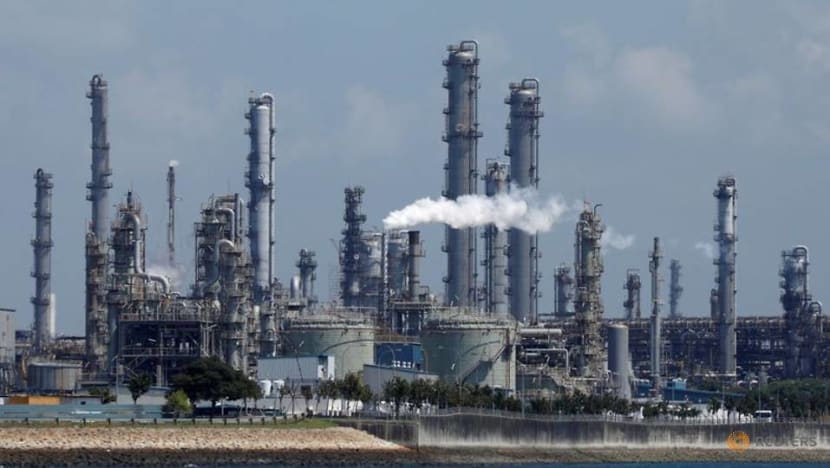Former Shell employee admits conspiring to embezzle S$49m worth of gas oil from Pulau Bukom site

FILE PHOTO: A general view of Shell's Pulau Bukom petrochemical complex in Singapore on Jul 15, 2019. (File Photo: REUTERS/Edgar Su)
SINGAPORE: A former Shell employee who was part of a syndicate that routinely embezzled millions of dollars' worth of gas oil from the Pulau Bukom manufacturing site for sale to other vessels pleaded guilty to his involvement on Tuesday (Dec 15).
Indian national Sadagopan Premnath, 40, is the first Shell employee involved in the heist to admit to his charges.
He pleaded guilty to four charges of abetting criminal breach of trust as a servant involving S$49 million worth of misappropriated gas oil in 2017 and 2018. Another five charges will be considered in his sentence.
Gas oil is a type of commercial fuel product used in many industries, including the marine sectors.
Sadagopan began working at Shell Eastern Petroleum around 2012 as a fieldman or panel operator, drawing a basic salary of about S$2,400 and earning up to S$4,000 with overtime pay.
As a fieldman, he took instructions from the panel operator to manually open or close large, heavy-duty valves. When functioning as a panel operator, he learnt to operate the black oil control panels that digitally controlled valve movements.
The heist occurred at the manufacturing site on Shell Pulau Bukom, Shell's largest wholly owned refinery in the world in terms of crude oil distillation capacity and its largest petrochemical production and export centre in the Asia Pacific.
The conspiracy to misappropriate gas oil began in 2007 with co-accused Juandi Pungot and Abdul Latif Ibrahim, both Shell employees, and grew to involve more people over 11 years.
READ: Chief officer of tanker in 'unprecedented' S$3.5 million Shell oil heist jailed
The accused was recruited by Juandi and joined the syndicate in mid-2017. Juandi hired him because he was worried that another colleague was being deployed as a panel man too often and Shell management might discover the crimes.
Sadagopan agreed to join the syndicate in part because he was worried that his more senior colleagues might treat him with hostility, the court heard.
There were several methods of misappropriating the gas oil, including configuring the flow through carefully planned routes that avoided certain meters; ensuring that multiple pumps and tanks were operating at the same time to mask the acts; and carefully timing legitimate loading of purchased gas oil to transfer the stolen oil.
Sadagopan's role was to take directions from his co-conspirators and act as a black oil panel man to open and close valves so that awaiting vessels could receive the misappropriated gas oil.
As Sadagopan was more junior than the rest, he initially sat beside his accomplices and observed the acts before controlling the panel to mask the pattern of illegal loading. He did not know who was buying the stolen gas oil.
He received about US$150,000 (S$200,300) from the criminal proceeds and has made no restitution to Shell, the court heard.
SHELL NOTICES OIL LOSSES, TRIES FOR YEARS TO RESOLVE ISSUE
In early 2015, Shell noticed significant unidentified oil loss at Pulau Bukom using its accounting process. It engaged a group of experts from its other offices to conduct a review, but the misappropriation was not detected.
Shell Pulau Bukom then implemented various measures, including enhancing its accounting processes, improving its custody transfer meters and operational improvement items, but continued to experience unidentified oil loss.
In early 2017, Shell engaged a third-party consultant to conduct a five-week review of its hydrocarbon losses, but no conclusive explanation could be found.
Around the same time, Shell Pulau Bukom had its highest hydrocarbon loss since 2015, and the team tracking and investigating the losses began to suspect misappropriation.
READ: 11 charged over multi-million dollar Shell oil heist in Singapore
The company engaged a global multidisciplinary team of Shell analysts to monitor tank movements and analyse the available data. After the suspected theft of gas oil via unauthorised transfer to other vessels was detected, Shell filed a police report in August 2017.
Since the discovery of the large-scale misappropriation, Shell has taken many costly measures to improve its systems and processes including the installation of new and additional custody transfer meters and anti-theft closed-circuit television cameras and developing monitoring software.
By the end of this year, the estimated cost directly incurred or to be incurred by Shell to manage the consequence of the long-term misappropriation will amount to about S$6 million.
Sadagopan will return to court for mitigation and sentencing in February.
The cases for several of Sadagopan's accomplices are pending. Several officers from the tankers that received the stolen gas oil from Pulau Bukom have been jailed, including a chief officer who was imprisoned in July last year.














